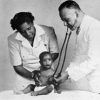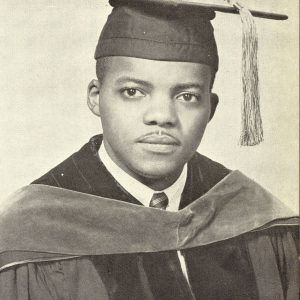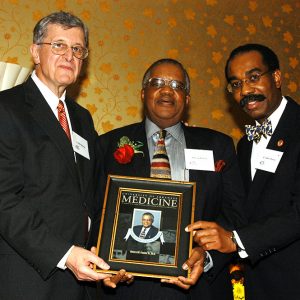calsfoundation@cals.org
Henry W. Foster Jr. (1933–2022)
Henry Wendell Foster Jr. was an Arkansas-born obstetrician-gynecologist and a dean at Meharry Medical College. He was nationally recognized as an expert on teen pregnancies, drug abuse, and infant mortality. After fellow Arkansan Joycelyn Elders’s resignation after a year as U.S. surgeon general, Foster was selected by President Bill Clinton as a replacement nominee.
Henry W. Foster Jr. was born on September 8, 1933, in Pine Bluff (Jefferson County) to Henry Foster Sr. and Ivie Foster. He was raised, along with his sister, in a family that prized education. His father was a high school science teacher and later worked as a chemist at the Pine Bluff Arsenal, and his mother was an art teacher at AM&N College (now the University of Arkansas at Pine Bluff).
In 1950, Foster graduated from high school at the J. C. Corbin Laboratory School on the campus of Arkansas AM&N, where he was valedictorian of his class. Wishing to further his education at his father’s alma mater, Foster attended Morehouse College in Atlanta, Georgia, a private Black liberal arts college for men. He graduated in 1954 with a degree in biology.
Foster applied to several Black medical schools. At that time, in the segregated South, predominately white medical colleges did not readily accept Black students. However, among his applications, Foster took a chance on the University of Arkansas Medical School (now UAMS), encouraged by the school’s prior admittance of Edith Irby Jones.
When Foster received an acceptance letter from UAMS, he remained unsure of whether to accept. It was a daunting choice between a Black school and one where he would be a distinct minority. Foster confided his indecision to civil rights activist Daisy Bates, who persuaded him that by accepting he would be creating an opportunity for a prospective student at one of the Black universities. Foster entered UAMS in 1954 as the only African American in his class of ninety-six students. He exceled in his studies and was inducted into Alpha Omega Alpha, a medical honors society, becoming the first Black student from Arkansas to obtain the honor. Foster earned his medical degree from UAMS in 1958.
Upon graduation, Foster began an internship at the Detroit Receiving Hospital in Detroit, Michigan, where he met St. Clair Anderson. The couple married two years later and raised two children. In 1959, Foster entered the U.S. Air Force, where he served two years as a medical officer. He then completed one year of residency training in general surgery at Malden Hospital in Malden, Massachusetts, and in 1965 completed a three-year residency in obstetrics and gynecology at Meharry Medical College in Nashville, Tennessee. In 1965, Foster took a position at the John A. Andrew Memorial Hospital in Tuskegee, Alabama, where he worked with poorer rural communities. In 1973, Foster became chair of obstetrics and gynecology at George W. Hubbard Hospital of Meharry Medical College, and in 1975 accepted a faculty position at Vanderbilt University as a clinical professor of obstetrics and gynecology.
In 1987, at Meharry, Foster developed and directed the “I Have a Future” initiative to combat teen pregnancies through promoting the benefit of sex education and abstinence. His program sought to provide at-risk teens with the guidance to make positive life choices through community support and intervention. In 1991, Foster’s initiative was praised by President George H. W. Bush as one of the nation’s “Thousand Points of Light.”
On February 2, 1995, President William J. Clinton nominated Foster to succeed Joycelyn Elders as U.S. surgeon general. Foster proposed that he could impact national statistics on teen pregnancies by allocating federal resources to aid grassroots programs based on his “I Have a Future” model. However, his nomination was opposed by senators who argued that Foster had provided contradictory information on the number of abortions he had performed as a practicing gynecologist, and some accused him of knowing about the Tuskegee experiment, in which approximately 400 Black men with syphilis were left untreated, before it was revealed in 1972. While many of the accusations were dismissed, Foster’s stances on abortion and teen contraception were deemed by Republican senators to echo those of the departing Elders. With Foster’s nomination stalled in Congress, President Clinton appointed him as his senior advisor on Teen Pregnancies and Youth Issues and as a consultant to the Department of Health and Human Services and the Centers for Disease Control and Prevention.
Foster was inducted into the Institute of Medicine of the National Academy of Sciences in 1972. He received the Faculty Award for Excellence in Science and Technology from the White House Initiative on Historically Black Colleges and Universities in 1988. Foster was awarded professor emeritus status from Meharry Medical College in 1999, and the following year he completed his tenure as dean of Meharry Medical College and Vice President for Medical Services. In 2004, Foster became an inaugural member of the UAMS College of Medicine Hall of Fame. In 2014, he was honored as a healthcare pioneer with a marker on the Arkansas Civil Rights Heritage Trail. In 2016, Foster entered the Tennessee Health Care Hall of Fame.
Foster died after a brief illness on September 25, 2022, in Pasadena, California.
For additional information:
Foster, Henry W. “Why I Want to Be Surgeon General.” Washington Post, February 15, 1995.
Foster, Henry W., and Alice Greenwood. Make a Difference: The Founder of the I Have a Future Program Shares His Vision for Young America. New York: Scribner, 1997.
Haman, John. “Arkansas Runs Deep in Henry Foster.” Arkansas Times, March 17, 1995, p. 13.
Henry W. Foster, Jr., M.D. Biographical File. Historical Research Center, University of Arkansas for Medical Sciences Library, Little Rock, Arkansas.
Nominations of Dr. Henry Foster for Surgeon General. Congressional Record. Vol. 141, no. 26 (1995).
Geoffery L. Stark
Historical Research Center
University of Arkansas for Medical Sciences








Comments
No comments on this entry yet.